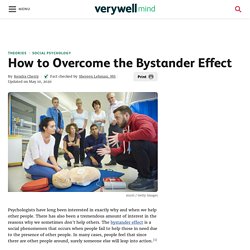

The more people watching the mishap, the less likely anyone calls for help or extend any help for the victim; let someone else help the victim. It seems to be a norm not helping when someone needs help, be it a small incident or life-threatening accident; ''minding your own business"
or " don't be a busy body" is a way of life.
Sexual assault and the bystander effect: Inaction of passers-by is a grave problem which needs to be addressed - India News , Firstpost.
Why do bystanders often stand and stare instead of helping the victim?

Turns out this is a well-documented psychological phenomenon. On 29 April, in Jehanabad, Bihar, a group of men molested a minor girl in broad daylight, while the people who had gathered around the scene did nothing to help her. Some even took videos of the incident, which then went viral. Just a few weeks earlier, on 5 April, a woman was attacked and molested by a man while on board a Mumbai local train, in full view of the passengers who didn’t even attempt to stop the attacker. 18-year-old Samyukhtha Sunil was one among many women harassed during the infamous 2017 New Year’s Eve incident in Bengaluru on Brigade Road.
We hear these stories all the time and we wonder, when it comes to accidents, molestation and assaults, why do bystanders often stand and stare instead of helping the victim? Representational image. Why? Remember that bystanders are not just strangers. When do bystanders help? 1. 2. 3. 4. 5. 6. 7. 8. 9. Minneapolis police officer charged with murder in George Floyd case. A white former Minneapolis police officer was charged with murder on Friday after a bystander video showed him pinning his knee into the neck of an unarmed black man who later died, an incident that triggered three nights of violent protests.

Derek Chauvin, the officer seen on the cellphone video footage kneeling on George Floyd's neck, is in custody and has been charged with third-degree murder and manslaughter, Hennepin County Attorney Mike Freeman told a news briefing. "We have evidence, we have the citizen's camera's video, the horrible, horrific, terrible thing we have all seen over and over again, we have the officer's body-worn camera, we have statements from some witnesses," Freeman said. The graphic footage, taken during the Monday evening arrest, shows Floyd, 46, gasping for air and pleading for help as he repeatedly groans, "please, I can't breathe," while onlookers can be heard shouting at police to let him up.
Floyd gradually grew unresponsive and ceased to move. Lawyer, family: 7-Eleven, bystanders failed assault victim before he died - Chicago Tribune. How to Overcome the Bystander Effect. Psychologists have long been interested in exactly why and when we help other people.

There has also been a tremendous amount of interest in the reasons why we sometimes don't help others. The bystander effect is a social phenomenon that occurs when people fail to help those in need due to the presence of other people. In many cases, people feel that since there are other people around, surely someone else will leap into action.1 While the bystander effect can have a negative impact on prosocial behavior, altruism and heroism, researchers have identified a number of different factors that can help people overcome this tendency and increase the likelihood that they will engage in helping behaviors.2 Some of these include: Witnessing Helping Behavior Sometimes just seeing other people doing something kind or helpful makes us more willing to help others.
Imagine that you are walking into a large department store. Being Observant Being Skilled and Knowledgeable Guilt Feeling Good. How to Get People to Help Each Other - Nir&Far - Episode#30. How to Break the Bystander Effect. They could have left it to someone else. An Army veteran blocked a shooter in Oregon from entering his classroom. Three friends on a high-speed train from Paris to Amsterdam helped stop a gunman wielding an AK-47. This past spring, an Army captain in North Carolina pulled a couple to safety after a fiery car crash. Were these men instinctively courageous, or had they learned to be?
The Army captain (aptly wearing a Captain America T-shirt) credited his military training for knowing what to do and remaining calm. These heroes are dramatic examples. And this conundrum is not limited to thwarting terrorism or physically saving someone. But we often look the other way, like the priest and Levite in the Good Samaritan parable. The Bystander Effect The bystander effect is a phenomenon that occurs when individuals witness someone in trouble, but don’t offer help.
Causes of the Bystander Effect Fear and Uncertainty: Sometimes, it’s not easy to tell if intervention is needed. We seek guidance.